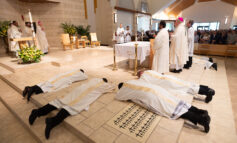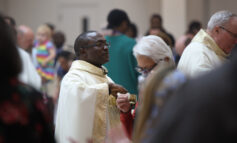By Father Thomas Esposito
Special to The Texas Catholic
God does not experience or suffer emotions as we do. Theologians rightly point out that the divine essence, so utterly transcendent, not limited by bodily form, cannot be moved or changed in the way that human beings are, subject as we are to the passage of time, emotional upheaval, and our mortal bodies. Given the radical differences between our human being and the being of God, the perception of God as distant, unreachable, and apparently uninterested in our here and now, is understandable.
The great mystery of the Christian faith, however, is the fact that God does not remain isolated and aloof from the affairs of creation. St. Bernard of Clairvaux has an exquisite phrase that can only be paraphrased in English: Impassibilis est Deus, sed non incompassibilis, “God cannot suffer, but He can have compassion,” that is, suffer with, us lowly beings. That is precisely the glorious sense of the Incarnation: St. Paul highlights that God’s “philanthropy,” or love of humanity, finds its most perfect proof in the life of Jesus Christ, whose death and resurrection point us to the path that we are to follow in order to imitate the Lord of life and love (see Titus 3:4).
The one who does not need us wants to need us, and longs for our response to His infinite love packaged in the person of Christ. The Gospels express on several occasions the nature of that love as a combination of pity, compassion, and reconciliation. When Jesus sees the vast crowd that has been attentive to his preaching but is now hungry in the desert, Mark notes that “his heart was moved with pity for them, for they were like a sheep without a shepherd” (Mark 6:34). Jesus then nourishes them all with the five loaves of bread and two fish. “His heart was moved with pity” is the five-word translation of one single Greek verb that also shows up in two of Jesus’ most beloved parables.
When the father of the prodigal son sees him coming home after wasting his inheritance, he is “filled with compassion,” and rushes out to meet the wayward lad, announcing that a great feast should be held in honor of his return (Luke 15:11-32). Earlier in Luke’s Gospel, Jesus responds to the question of a legal scholar regarding the definition of one’s neighbor with the parable of the Good Samaritan. After a priest and a Levite pass by a horribly beaten man on the side of the road, a Samaritan, a member of the hated enemy of the Jews, is “moved with compassion,” and ensures that the man will not die from his wounds (Luke 10:29-37).
The verb used to describe the compassion of the various figures, esplanchnisthe, means “to have a visceral reaction,” to be punched in the gut with compassion. The corresponding noun, splanchna (pronounced SPLAHNK-nah) just sounds cool, but St. Paul uses it on occasion to highlight his deep own affection for his fellow believers. Literally, splanchna are your guts, your bowels, though our translations usually render the word with the more gentle “heart” or “affection.” Philippians 1:8 would be distinctly awkward if it were translated literally as “how I long for you all with the bowels of Christ Jesus,” and a slavishly accurate rendering of Philemon 20, “Refresh my bowels in Christ,” is just plain gross.
But contained within this verb and noun combination is the core of the mystery of divine love. God so desired to be moved with pity that He wanted to identify with our pain by becoming one of us in Christ. That compassion, the movement of his splanchna, reminds us that God is never too distant or removed from our experience to care. No — the guts of Christ are moved with pity, and compel him to rescue us prodigal sons and half-beaten human beings by inviting us to receive his selfless love. And Jesus invites us to channel that same compassion, to allow our splanchna to be moved, when we look at others: “Go and do likewise” is the final word he, the divine Samaritan, gives to the legal scholar who asked him about his neighbor.
Father Thomas Esposito, O.Cist., is a theologian and monk at the Cistercian Abbey of Our Lady of Dallas in Irving. His column appears occasionally in The Texas Catholic.



